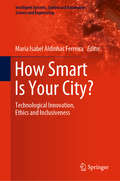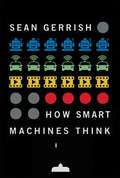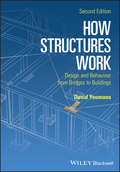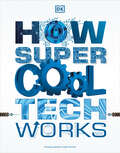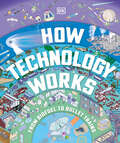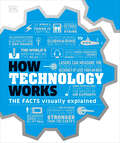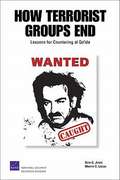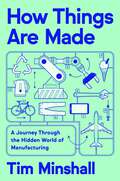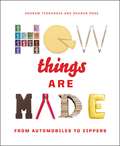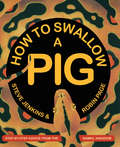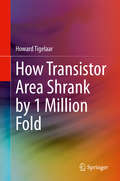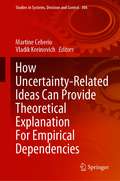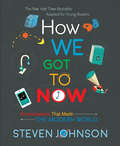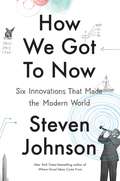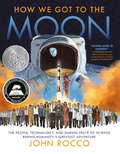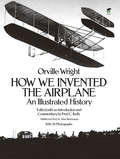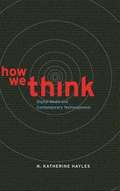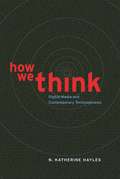- Table View
- List View
How Slippery Is a Banana Peel?
by Rebecca DonnellyRebecca Donnelly's How Slippery Is a Banana Peel? is a picture book companion to Cats Are a Liquid celebrating the science and the slipperiness of banana peels—a perfect introduction to friction, featuring illustrations by Misa Saburi.Volcanoes roar,But banana peels race.Rockets soar,Like bananas through space.A group of kid-experimenters at a science fair explore the slipperiness of banana peels—a perfect introduction to scientific concepts! It's funny and STEM-inspired, with back matter on friction and a kitchen science experiment. These playful and mischievous banana peels will capture the imagination of readers.
How Smart Is Your City?: Technological Innovation, Ethics and Inclusiveness (Intelligent Systems, Control and Automation: Science and Engineering #98)
by Maria Isabel Aldinhas FerreiraThis book focuses on the potential benefits that the so-called smart technologies have been bringing to the urban reality and to the management and governance of the city, simultaneously highlighting the necessity for its responsible and ethically guided deployment, respecting essential humanistic values. The urban ecosystem has been, in the last decades, the locus to where the most advanced forms of technological innovation converge, creating intelligent management platforms meant to produce models of energy, water consumption, mobility/transportation, waste management and efficient cities. Due to the coincidence of the punctual overlap of its own genesis with the pandemics outbreak, the present book came to embody both the initial dream and desire of an intelligent city place of innovation, development and equity – a dream present in most of the chapters – and the fear not just of the pandemics per se, but of the consequences that this may have for the character of the intelligent city and for the nature of its relationship with its dwellers that, like a mother, it is supposed to nurture, shelter and protect.
How Smart Machines Think (The\mit Press Ser.)
by Sean GerrishEverything you've always wanted to know about self-driving cars, Netflix recommendations, IBM's Watson, and video game-playing computer programs.The future is here: Self-driving cars are on the streets, an algorithm gives you movie and TV recommendations, IBM's Watson triumphed on Jeopardy over puny human brains, computer programs can be trained to play Atari games. But how do all these things work? In this book, Sean Gerrish offers an engaging and accessible overview of the breakthroughs in artificial intelligence and machine learning that have made today's machines so smart.Gerrish outlines some of the key ideas that enable intelligent machines to perceive and interact with the world. He describes the software architecture that allows self-driving cars to stay on the road and to navigate crowded urban environments; the million-dollar Netflix competition for a better recommendation engine (which had an unexpected ending); and how programmers trained computers to perform certain behaviors by offering them treats, as if they were training a dog. He explains how artificial neural networks enable computers to perceive the world—and to play Atari video games better than humans. He explains Watson's famous victory on Jeopardy, and he looks at how computers play games, describing AlphaGo and Deep Blue, which beat reigning world champions at the strategy games of Go and chess. Computers have not yet mastered everything, however; Gerrish outlines the difficulties in creating intelligent agents that can successfully play video games like StarCraft that have evaded solution—at least for now. Gerrish weaves the stories behind these breakthroughs into the narrative, introducing readers to many of the researchers involved, and keeping technical details to a minimum. Science and technology buffs will find this book an essential guide to a future in which machines can outsmart people.
How Solar Energy Became Cheap: A Model for Low-Carbon Innovation
by Gregory F. NemetSolar energy is a substantial global industry, one that has generated trade disputes among superpowers, threatened the solvency of large energy companies, and prompted serious reconsideration of electric utility regulation rooted in the 1930s. One of the biggest payoffs from solar’s success is not the clean inexpensive electricity it can produce, but the lessons it provides for innovation in other technologies needed to address climate change. Despite the large literature on solar, including analyses of increasingly detailed datasets, the question as to how solar became inexpensive and why it took so long still remains unanswered. Drawing on developments in the US, Japan, Germany, Australia, and China, this book provides a truly comprehensive and international explanation for how solar has become inexpensive. Understanding the reasons for solar’s success enables us to take full advantage of solar’s potential. It can also teach us how to support other low-carbon technologies with analogous properties, including small modular nuclear reactors and direct air capture. However, the urgency of addressing climate change means that a key challenge in applying the solar model is in finding ways to speed up innovation. Offering suggestions and policy recommendations for accelerated innovation is another key contribution of this book. This book will be of great interest to students and scholars of energy technology and innovation, climate change and energy analysis and policy, as well as practitioners and policymakers working in the existing and emerging energy industries.
How Space Works: The Facts Visually Explained (DK How Stuff Works)
by DKEmbark on an awe-inspiring and informative journey through our Solar System and beyond in this illuminating astronomy book! Discover how big the Universe is, why our view of the sky is constantly changing, what came before the Big Bang, and so much more in 3... 2... 1…. Blast Off! Inside the pages of this comprehensive guide to astronomy for beginners, you&’ll discover: • Simple text and step-by-step graphics that make astronomy easy to understand • Fun facts and tip-of-the-tongue questions are presented through bite-sized factoids and question-and-answer features • Clear explanations demystifying more advanced topics such as cosmic rays, dark matter, and black hole collisions Take a peek at what lies beyond the stratosphereThis out-of-this-world reference book about space introduces you to the weird and wonderful discipline of astronomy and space exploration. From the structure of the Milky Way to the Earth&’s nearest celestial body, the Moon, How Space Works takes you on an unforgettable tour through the stars and galaxies, and to the furthest reaches of space!Answering all your burning questions about space, from ancient white dwarf stars to the Mars Rover, this visual guide explains the essentials of astronomy through bold graphics and step-by-step artworks. It&’s the ultimate book for armchair astronomers and space-technology enthusiasts looking for reliable and up-to-date facts and explanations.Don&’t let the learning stop - try the rest of the series!DK's How Things Work series uses dynamic graphics and jargon-free text to explain the modern world simply and clearly. Packed with fascinating facts and stats, these visual guides cover everything from science to philosophy, making complex topics more accessible than ever before!
How Structures Work
by David YeomansStructural engineering is central to the design of a building. How the building behaves when subjected to various forces - the weight of the materials used to build it, the weight of the occupants or the traffic it carries, the force of the wind etc - is fundamental to its stability. The alliance between architecture and structural engineering is therefore critical to the successful design and completion of the buildings and infrastructure that surrounds us. Yet structure is often cloaked in mathematics which many architects and surveyors find difficult to understand. How Structures Work has been written to explain the behaviour of structures in a clear way without resorting to complex mathematics. This new edition includes a new chapter on construction materials, and significant revisions to, and reordering of the existing chapters. It is aimed at all who require a good qualitative understanding of structures and their behaviour, and as such will be of benefit to students of architecture, architectural history, building surveying and civil engineering. The straightforward, non-mathematical approach ensures it will also be suitable for a wider audience including building administrators, archaeologists and the interested layman.
How Super Cool Tech Works
by DKDiscover the mind-blowing high-tech inventions of the future! Incredible images reveal the secret inner workings of everything from drones and supercomputers to underwater hotels and flying cars.How Super Cool Tech Works explains how incredible technologies will shape the world of tomorrow. Explore robotics, space rockets, artificial intelligence, and even game consoles in this cutting-edge non-fiction science book for kids aged 9 and over. Also featured are state-of-the-art buildings, new ways of traveling, imaginative entertainment gadgets, and even how teleportation and invisibility cloaks might be possible in the future. Each exciting subject is explained in detail, via crisp images and engaging, child-friendly text. "How it works" panels explain each subject&’s secret inner workings.New and updated for 2020, How Super Cool Tech Works is a one-stop shop for kids who want to know what the latest and greatest technologies are, and how they will shape our world in the years to come.
How Technology Works
by DKGet inside the machinery of the modern world and understand the science that makes it all work.Have you ever been tempted to take the back off your TV? Have you wondered about what's going on beneath your feet on the street where you live? How Technology Works lifts the lid on the technology you use all the time but take for granted. It also takes you to places you'll never get the chance to see, such as the inside of a nuclear storage facility or the crew capsule on top of a moon rocket. The book takes you on a journey of discovery, starting with technology at work inside the human body before exploring cities and factories and then blasting off into space. Along the way, you'll lose yourself in super-detailed illustrations that reveal amazing hidden things and explain how they work.How Technology Works is an inspiring guide that makes technology fun, fascinating, and accessible for curious minds of all ages.
How Technology Works: The Facts Visually Explained (DK How Stuff Works)
by DKHave you ever asked yourself how the inventions, gadgets, and devices that surround us actually work? Discover the hidden workings of everyday technology with this graphic guide.How Technology Works demystifies the machinery that keeps the modern world going, from simple objects such as zip fasteners and can openers to the latest, most sophisticated devices of the information age, including smartwatches, personal digital assistants, and driverless cars. It includes inventions that have changed the course of history, like the internal combustion engine, as well as technologies that might hold the key to our future survival, including solar cells and new kinds of farming to feed a growing population. Throughout the book, step-by-step explanations are supported by simple and original graphics that take devices apart and show you how they work. The opening chapter explains principles that underpin lots of devices, from basic mechanics to electricity to digital technology. From there, devices are grouped by application--such as the home, transportation, and computing--making them easy to find and placing similar devices side by side. How Technology Works is perfect for anyone who didn't have training in STEM subjects at school or is simply curious about how the modern world works.
How Terrorist Groups End: Lessons for Countering Al Qa'ida
by Seth G. Jones Martin C. LibickiAll terrorist groups eventually end. But how do they end? The evidence since 1968 indicates that most groups have ended because (1) they joined the political process (43 percent) or (2) local police and intelligence agencies arrested or killed key members (40 percent). Military force has rarely been the primary reason for the end of terrorist groups, and few groups within this time frame have achieved victory. This has significant implications for dealing with al Qa'ida and suggests fundamentally rethinking post-9/11 U.S. counterterrorism strategy: Policymakers need to understand where to prioritize their efforts with limited resources and attention. The authors report that religious terrorist groups take longer to eliminate than other groups and rarely achieve their objectives. The largest groups achieve their goals more often and last longer than the smallest ones do. Finally, groups from upper-income countries are more likely to be left-wing or nationalist and less likely to have religion as their motivation. The authors conclude that policing and intelligence, rather than military force, should form the backbone of U.S. efforts against al Qa'ida. And U.S. policymakers should end the use of the phrase 'war on terrorism' since there is no battlefield solution to defeating al Qa'ida.
How Things Are Made: A Journey Through the Hidden World of Manufacturing
by Tim MinshallAn illuminating tour through the manufacturing world and its seismic influence on our lives, from internationally renowned expert Tim MinshallWe live in a manufactured world. Unless you are floating naked through space, you are right now in direct contact with multiple manufactured products, including furniture, technology, clothing, and even food. And yet the processes by which these things appear in our lives are virtually invisible. How often do we stop to think: Where do the things we buy actually come from? How are they made, and how do they make their way into our hands?The answers can be found in How Things Are Made, which traces the surprising paths taken by everyday items to reach consumers, from design to creation to delivery. Innovation expert Tim Minshall takes us on a journey through the manufacturing world, from the smallest job shops to mega-factories, from global shipping hubs to local delivery at your door, revealing the inner workings of the system that runs 24-7-365 to make and deliver the things we need—or want—to live our daily lives, including cars, cakes, phones, planes, drugs, and medical devices. Along the way, he explores how we can improve the fragility of our global manufacturing system and the impact it has on the natural world, presenting a path to a truly sustainable future.Brimming with energy and lively examples, How Things Are Made maps the awe-inspiring global system of manufacturing that enables virtually every aspect of our existence. By making sense of this surprising and hidden world, we are able to make better choices for ourselves, our communities, and the planet.
How Things Are Made: From Automobiles To Zippers
by Andrew TerranovaFor anyone curious about the nuts and bolts of human ingenuity, How Things Are Made is a fascinating exploration of the process behind the manufacture of everyday items.What are bulletproof vests made of? How do manufacturers get lipstick into the tube? How many layers are there in an iPhone screen? The answers to these questions and so much more fascinating information can be found in How Things Are Made, a behind-the-scenes look at the production everyday objects of all kinds, from guitars, sunscreen, and seismographs to running shoes, jet engines, and chocolate.Thoroughly revised and redesigned from the best-selling 1995 edition, How Things Are Made also contains three new entries by author Andrew Terranova. However, each page still contains informative step-by-step text along with detailed but easy-to-follow illustrations, diagrams, and sidebars to tell the stories behind the things we sometimes take for granted. For example, did you know that Edison didn't really invent the light bulb? Or that the first bar code was on a pack of Wrigley's Spearmint gum? Or that a maple seed inspired the design for the helicopter? Discover these fascinating anecdotes and much more in How Things Are Made.
How Things Work: A Child's First Library of Learning
by The Editors at the Time-Life BooksQuestions and answers provide information about how cameras, elevators, car engines, tops, yo-yos, and other devices work. Includes charts, diagrams, and an activities section.
How To Crush Social Media In Only 2 Minutes A Day: Twitter, Facebook, Instagram, Kred, Goodreads, Linkedin
by Ndeye Labadens James Goonwrite. ComPrepare to Crush the Game of Social Media! This is a fun and powerful method to promote your business, book, or item. Why Do You Need to Crush Social Network? This book offers step- by- step instructions to build your social media presence with your platforms and /or blog. You'll have access to multiple resources to help increase your sales and your online presence. For example, do you know the best keywords to use? When is the most beneficial time to use Twitter? How do you change listings on Goodreads? You'll find answers to these questions and many more. Prepare to Crush the Social Media in Only 2 Minutes a Day is a must-have!
How To Get Back Links: 10 Extremely Powerful Backlinks Sources To Building Website Backlinks And Exploding Your Traffic
by Brian GravesOver 60 website examples where you can find these 10 different back linking types, ranging from PR4-PR9.You also get strategies for each link type that you can use to increase website traffic.
How To Publish An Ebook Without Going Nuts... And So Somebody Reads It
by Alejandro Aguayo Charlotte CoombeSecond expanded edition of this simple step-by-step guide to publishing an eBook without dying in the attempt and how to avoid the typical beginner's mistakes. Full of tips, resources, software recommendations and above all the experience and advice of many "indie" authors currently enjoying eBook success, such as Blanca Miosi, Bruno Nievas, Enrique Laso, Gabri Ródenas, Lidia Herbada, Blas Ruiz Grau, Roberto Lopez-Herrero, Largo Javariega and others.
How To Swallow A Pig: Step-by-step Advice From The Animal Kingdom
by Steve Jenkins Robin PageIn the latest eye-catching escape into the kingdom of Animalia, Steve Jenkins and Robin Page reveal the skills animals use to survive in the wild in an imaginative and humorous how-to format. With step-by-step instructions, readers learn about specific behaviors; how to catch thousands of fish like a humpback whale or how to sew up a nest like a tailorbird. This fascinating and fun illustrated nonfiction melds science, art, biology, and the environment together in a detailed and well-researched book about animals who live and survive in our world today.
How Transistor Area Shrank by 1 Million Fold
by Howard TigelaarThis book explains in layman’s terms how CMOS transistors work. The author explains step-by-step how CMOS transistors are built, along with an explanation of the purpose of each process step. He describes for readers the key inventions and developments in science and engineering that overcame huge obstacles, enabling engineers to shrink transistor area by over 1 million fold and build billions of transistor switches that switch over a billion times a second, all on a piece of silicon smaller than a thumbnail.
How Uncertainty-Related Ideas Can Provide Theoretical Explanation For Empirical Dependencies (Studies in Systems, Decision and Control #306)
by Vladik Kreinovich Martine CeberioThis book shows how to provide uncertainty-related theoretical justification for empirical dependencies, on the examples from numerous application areas. Such justifications are needed, since without them, practitioners may be reluctant to use these dependencies: purely empirical formulas often turn out to hold only in some cases. Examples of new theoretical explanations range from fundamental physics (quark confinement, galaxy superclusters, etc.) and geophysics (earthquake analysis) to transportation and electrical engineering to computer science (image processing, quantum computing) and pedagogy (equity, effect of repetitions). The book is useful to students and specialists in the corresponding areas. Most of the examples use common general techniques, so the book is also useful to practitioners and researchers in other application areas who look for ways to provide theoretical justifications for their areas’ empirical dependencies.
How We Got to Now: Six Innovations That Made the Modern World
by Steven JohnsonDid you drink a glass of water today? Did you turn on a light? Did you think about how miraculous either one of those things is when you did it? Of course not--but you should, and New York Times bestselling author Steven Johnson has. This adaptation of his adult book and popular PBS series explores the fascinating and interconnected stories of innovations--like clean drinking water and electricity--that changed the way people live.Innovation starts with a problem whose solution sets in motion all kinds of unexpected discoveries. That's why you can draw a line from pendulums to punching the clock at a factory, from ice blocks to summer movie blockbusters, from clean water to computer chips.In the lively storytelling style that has made him a popular, bestselling author, Steven Johnson looks at how accidental genius, brilliant mistakes, and unintended consequences shape the way we live in the modern world. Johnson's "long zoom" approach connects history, geography, politics, and scientific advances with the deep curiousity of inventors or quirky interests of tinkerers to show how innovation truly comes about. His fascinating account is organized into six topics: glass, cold, sound, clean, time, light. Johnson's fresh exploration of these simple, single-syllable word concepts creates an endlessly absorbing story that moves from lightning strikes in the prehistoric desert to the herculean effort to literally raise up the city of Chicago to laser labs straight out of a sci-fi movie. In other words, it's the story of how we got to now!
How We Got to Now: Six Innovations That Made the Modern World
by Steven JohnsonFrom the New York Times-bestselling author of Where Good Ideas Come From and Everything Bad Is Good for You, a new look at the power and legacy of great ideas. In this illustrated volume, Steven Johnson explores the history of innovation over centuries, tracing facets of modern life (refrigeration, clocks, and eyeglass lenses, to name a few) from their creation by hobbyists, amateurs, and entrepreneurs to their unintended historical consequences. Filled with surprising stories of accidental genius and brilliant mistakes--from the French publisher who invented the phonograph before Edison but forgot to include playback, to the Hollywood movie star who helped invent the technology behind Wi-Fi and Bluetooth--How We Got to Now investigates the secret history behind the everyday objects of contemporary life. In his trademark style, Johnson examines unexpected connections between seemingly unrelated fields: how the invention of air-conditioning enabled the largest migration of human beings in the history of the species--to cities such as Dubai or Phoenix, which would otherwise be virtually uninhabitable; how pendulum clocks helped trigger the industrial revolution; and how clean water made it possible to manufacture computer chips. Accompanied by a major six-part television series on PBS, How We Got to Now is the story of collaborative networks building the modern world, written in the provocative, informative, and engaging style that has earned Johnson fans around the globe.
How We Got to the Moon: The People, Technology, and Daring Feats of Science Behind Humanity's Greatest Adventure
by John RoccoLONGLISTED FOR THE NATIONAL BOOK AWARDThis beautifully illustrated, oversized guide to the people and technology of the moon landing by award-winning author/illustrator John Rocco (illustrator of the Percy Jackson series) is a must-have for space fans, classrooms, and tech geeks.Everyone knows of Neil Armstrong's famous first steps on the moon. But what did it really take to get us there? The Moon landing is one of the most ambitious, thrilling, and dangerous ventures in human history. This exquisitely researched and illustrated book tells the stories of the 400,000 unsung heroes--the engineers, mathematicians, seamstresses, welders, and factory workers--and their innovations and life-changing technological leaps forward that allowed NASA to achieve this unparalleled accomplishment.From the shocking launch of the Russian satellite Sputnik to the triumphant splashdown of Apollo 11, Caldecott Honor winner John Rocco answers every possible question about this world-altering mission. Each challenging step in the space race is revealed, examined, and displayed through stunning diagrams, experiments, moments of crisis, and unforgettable human stories.Explorers of all ages will want to pore over every page in this comprehensive chronicle detailing the grandest human adventure of all time!
How We Invented the Airplane: An Illustrated History
by Orville WrightIt was the realization of a dream as old as mankind. On December 17, 1903, two bicycle mechanics from Dayton, Ohio, achieved the first sustained, powered, heavier-than-air flight in a machine of their own design and construction. This book offers a concise and fascinating history of that remarkable accomplishment, much of it in the words of the inventors themselves. The heart of the book is Orville Wright's personal account, written in connection with an obscure lawsuit filed against the U.S. government. Long forgotten until a typewritten copy was discovered among the Wright papers at the Library of Congress, it is the best, most detailed account of how the Wright brothers succeeded in creating the machine that lifted man into the sky on wings.The brothers first became interested in the problem of flight after reading about the glider experiments of Otto Lilienthal, a 19th-century German engineer. Experimenting first with kites and gliders, they developed a revolutionary wing design that helped solve the crucial problem of maintaining lateral equilibrium. Later, they added a movable rudder that eliminated the tendency of the machine to go into a tailspin. In addition to these critical innovations, the two inventors developed new accurate tables of "life" pressures and an original theory of air propellers. Slowly, methodically, with patience, perseverance, ingenuity, and inspired invention, they solved the problems that had defeated so many experimenters before them.Finally, on a gusty winter day in North Carolina, the Wright brothers flew their little motor-driven biplane off the sand at Kitty Hawk (actually Kill Devil Hills) and into the pages of history. Although the first flight lasted only about 12 seconds and covered barely 120 feet, it was the first time a machine carrying a man and driven by a motor had lifted itself from the ground in controlled free flight. A new era had begun and the world would never be the same again.The achievement of the Wright brothers is placed in historical context in the absorbing and informative introduction to this volume, written by Fred C. Kelly, author of two standard works on the Wrights. Mr. Kelly has also written an illuminating commentary, including fascinating anecdotes about the Wrights, their personalities and later aspects of their career. As an extra bonus, a lively popular account of the Wrights' success, written in 1908 by both brothers, has been included in an Appendix. Enhanced by 76 photographs, including many rare views of the Wrights and their flying machines, this book offers a thrilling reading experience for anyone interested in aviation, its pioneers, or the mechanics of flights.
How We Think: Digital Media and Contemporary Technogenesis
by N. Katherine Hayles"How do we think?" N. Katherine Hayles poses this question at the beginning of this bracing exploration of the idea that we think through, with, and alongside media. As the age of print passes and new technologies appear every day, this proposition has become far more complicated, particularly for the traditionally print-based disciplines in the humanities and qualitative social sciences. With a rift growing between digital scholarship and its print-based counterpart, Hayles argues for contemporary technogenesis--the belief that humans and technics are coevolving--and advocates for what she calls comparative media studies, a new approach to locating digital work within print traditions and vice versa. Hayles examines the evolution of the field from the traditional humanities and how the digital humanities are changing academic scholarship, research, teaching, and publication. She goes on to depict the neurological consequences of working in digital media, where skimming and scanning, or "hyper reading," and analysis through machine algorithms are forms of reading as valid as close reading once was. Hayles contends that we must recognize all three types of reading and understand the limitations and possibilities of each. In addition to illustrating what a comparative media perspective entails, Hayles explores the technogenesis spiral in its full complexity. She considers the effects of early databases such as telegraph code books and confronts our changing perceptions of time and space in the digital age, illustrating this through three innovative digital productions--Steve Tomasula's electronic novel, TOC; Steven Hall's The Raw Shark Texts; and Mark Z. Danielewski's Only Revolutions. Deepening our understanding of the extraordinary transformative powers digital technologies have placed in the hands of humanists, How We Think presents a cogent rationale for tackling the challenges facing the humanities today.
How We Think: Digital Media and Contemporary Technogenesis
by N. Katherine Hayles“How do we think?” N. Katherine Hayles poses this question at the beginning of this bracing exploration of the idea that we think through, with, and alongside media. As the age of print passes and new technologies appear every day, this proposition has become far more complicated, particularly for the traditionally print-based disciplines in the humanities and qualitative social sciences. With a rift growing between digital scholarship and its print-based counterpart, Hayles argues for contemporary technogenesis—the belief that humans and technics are coevolving—and advocates for what she calls comparative media studies, a new approach to locating digital work within print traditions and vice versa.Hayles examines the evolution of the field from the traditional humanities and how the digital humanities are changing academic scholarship, research, teaching, and publication. She goes on to depict the neurological consequences of working in digital media, where skimming and scanning, or “hyper reading,” and analysis through machine algorithms are forms of reading as valid as close reading once was. Hayles contends that we must recognize all three types of reading and understand the limitations and possibilities of each. In addition to illustrating what a comparative media perspective entails, Hayles explores the technogenesis spiral in its full complexity. She considers the effects of early databases such as telegraph code books and confronts our changing perceptions of time and space in the digital age, illustrating this through three innovative digital productions—Steve Tomasula’s electronic novel, TOC; Steven Hall’s The Raw Shark Texts; and Mark Z. Danielewski’s Only Revolutions. Deepening our understanding of the extraordinary transformative powers digital technologies have placed in the hands of humanists, How We Think presents a cogent rationale for tackling the challenges facing the humanities today.

